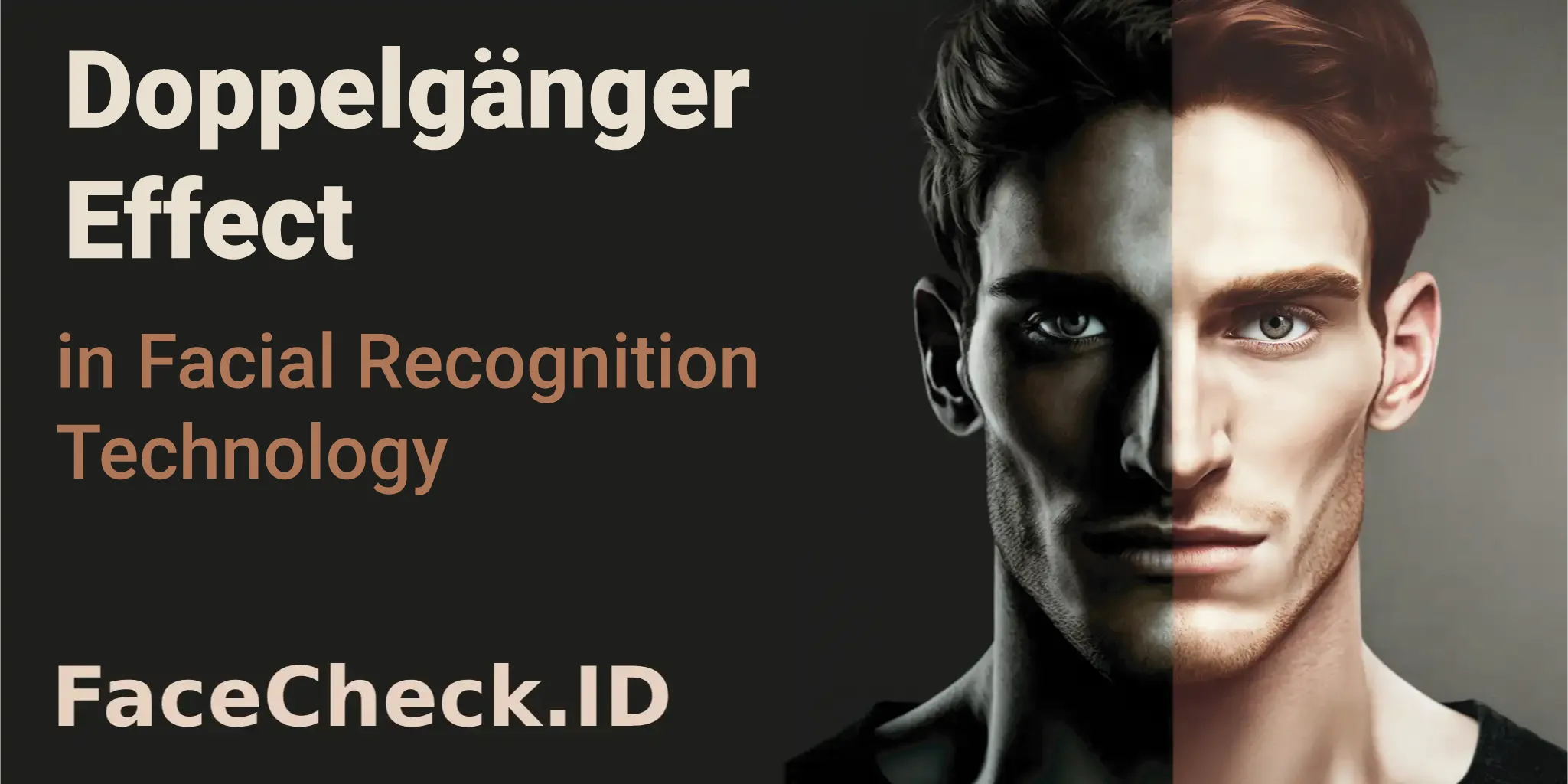Doppelgänger Effect in Facial Recognition Technology
How to Ensure Accurate Results and Minimize False Positive Matches in Facial Searches
Have you ever encountered someone who looks exactly like you, or someone close to you? This uncanny experience is known as the "Doppelgänger Effect."

The word "Doppelgänger" comes from German and literally means "double-goer." It's a phenomenon where a person sees their exact copy or a close likeness of themselves.
This effect can be unsettling and sometimes even frightening, but it's a common experience. In fact, many people have reported seeing their doppelgänger, either in a dream or in real life. The Doppelgänger Effect has been a subject of fascination for centuries, with many cultures believing that seeing your double was a bad omen or a sign of impending death.
However, there is a scientific explanation for the Doppelgänger Effect. It's believed that our brain is wired to recognize patterns and make connections between different people. When we see someone who looks similar to us, our brain tries to make a connection, causing us to feel as though we've seen our own double. This is often why people who see their doppelgänger feel a sense of déjà vu.
In some cases, the Doppelgänger Effect can be a manifestation of our subconscious desires or fears. For example, if someone is afraid of losing their job, they might see their doppelgänger as a replacement for themselves. Similarly, if someone has a strong desire for a particular relationship or situation, they might see their doppelgänger as a symbol of what they want.
The Doppelgänger Effect can also be caused by simple coincidence. There are billions of people in the world, and it's not uncommon for two people to resemble each other. This is especially true in large cities, where there are more people and more opportunities to encounter someone who looks like you.
Despite its unsettling reputation, the Doppelgänger Effect can actually have a positive impact on our lives. Seeing our own double can serve as a reminder of our own mortality and encourage us to live our lives to the fullest. It can also help us to see ourselves from a different perspective and gain a new understanding of our own personality and character.
Users of facial recognition systems should be aware of the Doppelgänger Effect when performing facial searches, as it can impact the accuracy of the results. The Doppelgänger Effect can cause confusion in facial recognition systems, resulting in false positive matches.
In this article, we're going to discuss
Best Practices in Using Facial Recognition
To minimize the impact of the Doppelgänger Effect, users of facial recognition systems should follow a few best practices:
- Verify the identity of the person: Before relying on the results of a facial recognition search, it's important to verify the identity of the person using other means. This could include checking their identification documents, asking questions, or using biometric methods, such as fingerprint or iris scanning.
- Use multiple data sources: To increase the accuracy of the results, users should use multiple data sources when performing facial searches. This could include a public database searches from other online sources.
- Use high-quality images: The quality of the image used in a facial recognition search can have a significant impact on the accuracy of the results. Users should use high-quality images, taken in well-lit conditions, to minimize the potential for false positive matches.
- Be mindful of similarities: Users should be mindful of the Doppelgänger Effect and consider the possibility of false positive matches when interpreting the results of a facial recognition search.
- Notice any birthmarks, scars, or tattoos: Another way to differentiate between two individuals who look alike is to look for any distinctive physical features, such as birthmarks, scars, or tattoos. These unique features can help to confirm the identity of the person and reduce the risk of false positive matches.
Doppelgänger Effect and Accuracy of Facial Recognition
The Doppelgänger Effect has a significant impact on the accuracy of facial recognition technology. As the size of the facial recognition database grows, the likelihood of finding two people who look similar, or doppelgängers, also increases. This phenomenon can lead to confusion and false positive matches in facial recognition searches, which can have serious implications for privacy and security.
To mitigate the impact of the Doppelgänger Effect, users of facial recognition technology should follow best practices, using multiple data sources, using high-quality images, being mindful of similarities, and noticing any distinctive physical features like birthmarks, scars, or tattoos.
However, it's important to keep in mind that the larger the facial recognition database, the greater the likelihood of finding two people who look alike. This highlights the importance of continually improving the accuracy and reliability of facial recognition technology to ensure that it works as intended and minimizes the risk of false positive matches.
While the Doppelgänger Effect can impact the accuracy of facial recognition technology, by being aware of this phenomenon and following best practices, users can ensure that their results are as accurate as possible.
Read More on Search by Image
How-To Guide for Effective Face Lookup
Got a photo but no name? Finding someone online using just their face is nearly impossible with standard search engines. Learn the techniques pros use to match facial features to profiles across the web - and the important ethics you need to consider before you search.
On the subject in other languages
Efeito Doppelgänger na Tecnologia de Reconhecimento Facial
面部识别技术中的“分身效应”
Dvojníkový efekt ve technologii rozpoznávání obličeje
Doppelgänger-Effekt in der Gesichtserkennungstechnologie
Efecto Doppelgänger en la Tecnología de Reconocimiento Facial
Effet Doppelgänger dans la technologie de reconnaissance faciale
Effetto Doppelgänger nella Tecnologia di Riconoscimento Facciale
顔認識技術におけるドッペルゲンガー効果
얼굴 인식 기술에서 도플갱어 효과
Efekt Sobowtóra w Technologii Rozpoznawania Twarzy
Эффект Двойника в технологии распознавания лиц
تأثير الشبيه في تقنية التعرف على الوجوه
Yüz Tanıma Teknolojisinde Doppelgänger Etkisi
Popular Topics
Doppelgänger Doppelgänger Effect Face Recognition Search Identity Facial Recognition How To Facial Recognition Technology Identification Facial Search YouTube Biometric Fingerprint Face SearchTop Reverse Image Search Tools: PimEyes vs FaceCheck Detailed Analysis
